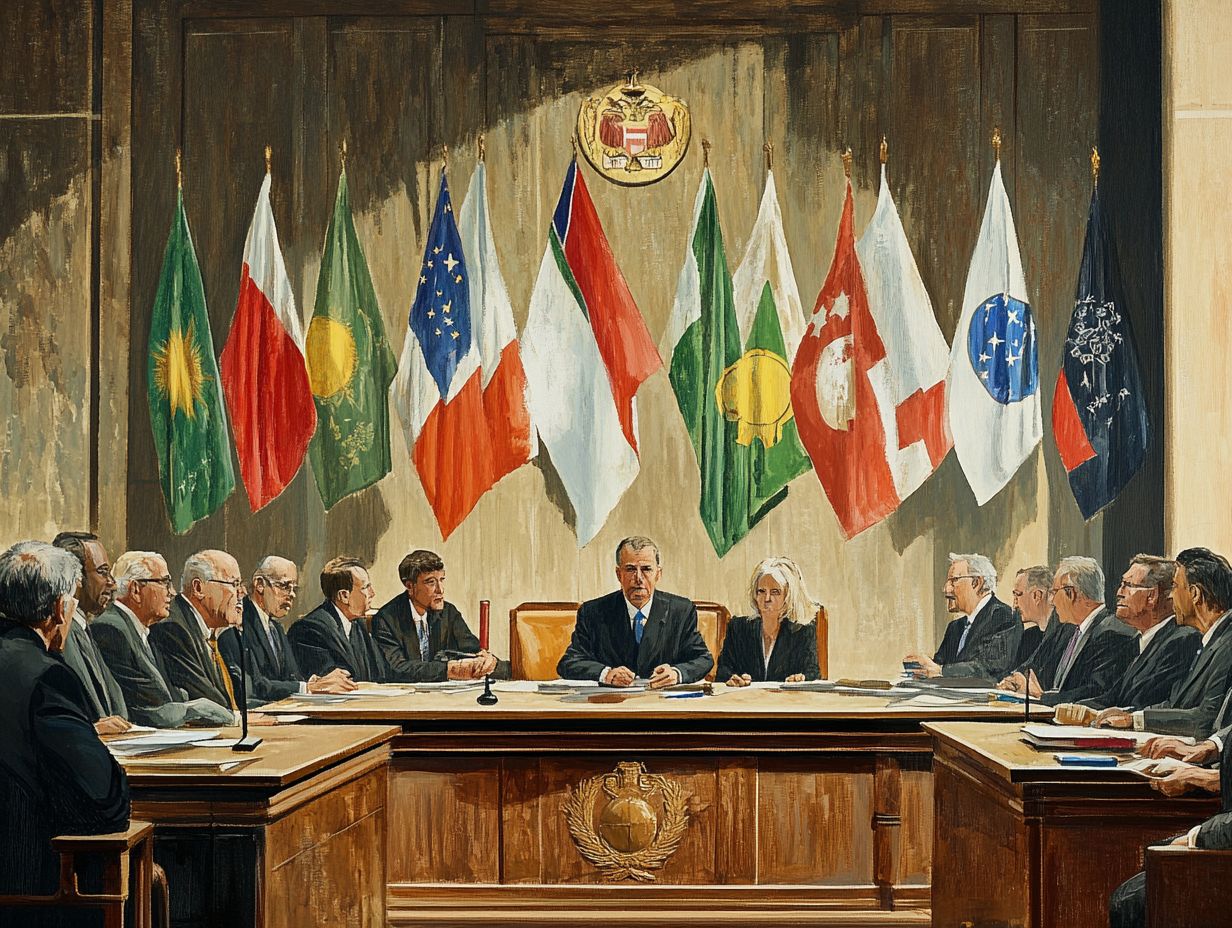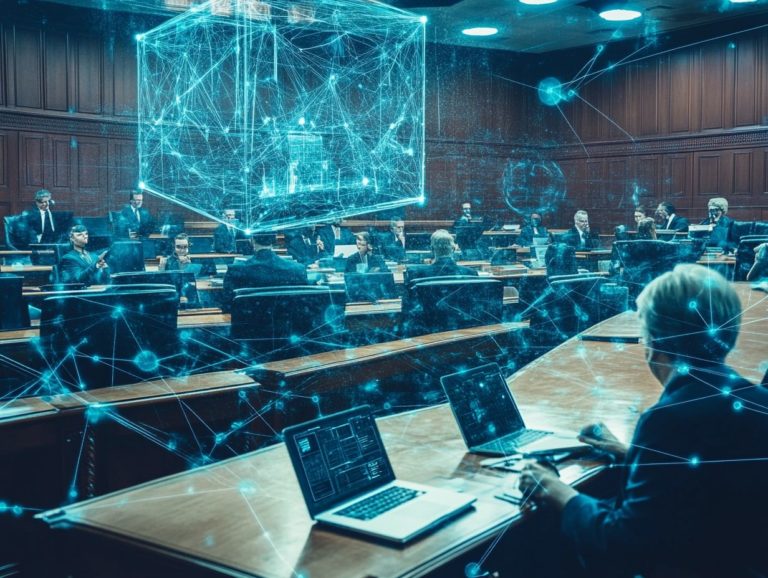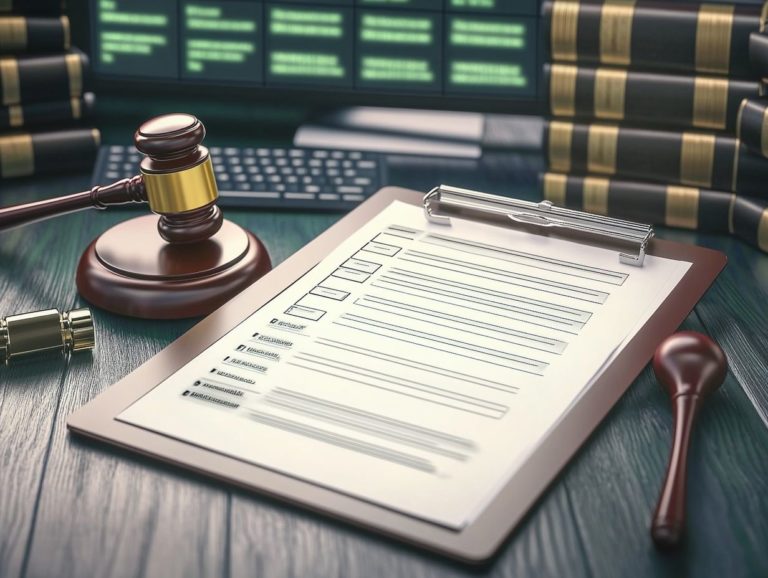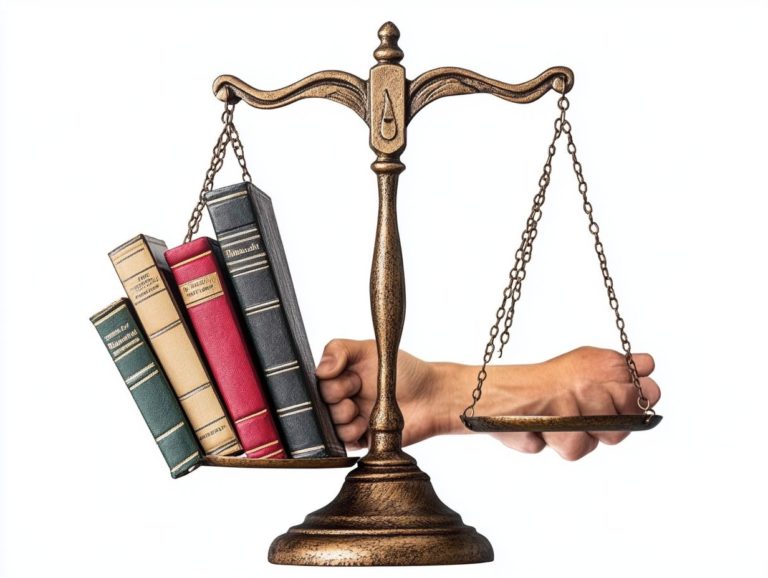The Role of International Law in IP Litigation
In today’s interconnected world, intellectual property (IP) stands as a cornerstone of innovation and creativity. Yet, navigating the complexities of IP litigation can feel overwhelming.
This article unpacks the many facets of IP litigation, guiding you through its definitions and types while shedding light on the impact of globalization and international law.
You’ll explore the key players involved, understand the challenges at hand, and discover strategies for achieving success.
Whether you’re an artist, inventor, or entrepreneur, grasping these dynamics is essential for safeguarding your creations on a global stage.
Contents
- Key Takeaways:
- Understanding Intellectual Property (IP) Litigation
- The Importance of International Law in IP Litigation
- Key Players in International IP Litigation
- Challenges and Controversies in International IP Litigation
- Strategies for Success in International IP Litigation
- Frequently Asked Questions
- What is the role of international law in IP litigation?
- The Role of International Law in IP Litigation
- How Does International Law Protect IP Rights?
- What Is the Role of International Courts in IP Litigation?
- How Does International Law Impact IP Litigation in Domestic Courts?
- What Are Some Challenges of Applying International Law in IP Litigation?
- How Can Parties Involved in IP Litigation Navigate the Complexities of International Law?
Key Takeaways:
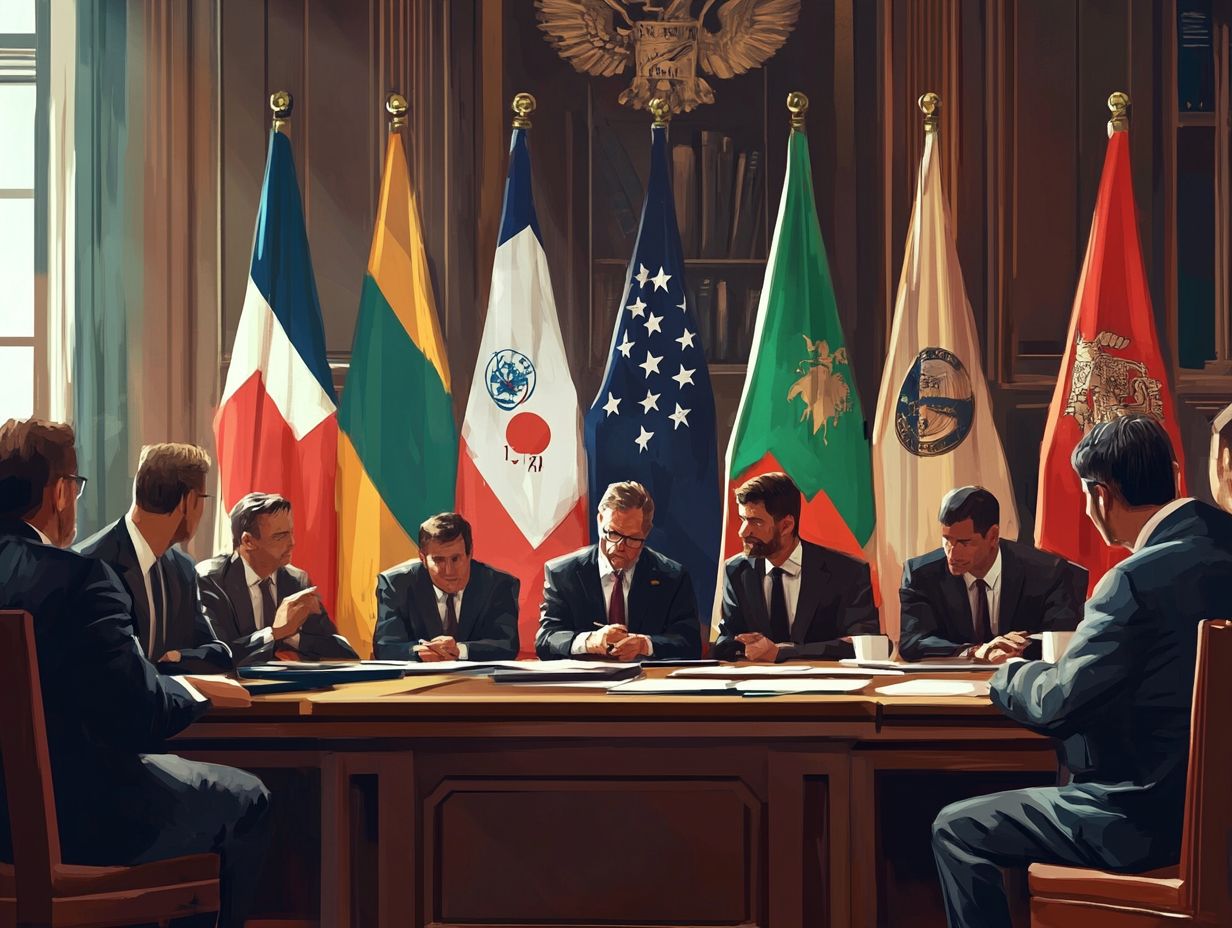
International law plays a crucial role in IP litigation, as it sets standards and guidelines that govern the protection and enforcement of intellectual property rights globally. Globalization has increased the complexity of IP litigation, making it essential for litigants to understand the impact of international treaties and agreements on their cases. To navigate the challenges and controversies in international IP litigation, it is important to have effective legal representation and consider alternative dispute resolution methods.
Understanding Intellectual Property (IP) Litigation
IP litigation involves legal rights associated with creations of the mind, such as inventions and artworks. This legal domain encompasses a variety of disputes, including those pertaining to patents, copyrights, trademarks, and trade secrets.
Each form of IP plays a vital role in safeguarding the interests of creators and innovators in an ever-evolving global economy. You must grasp the intricacies of IP litigation to protect your work effectively!
Definition and Types of IP
Intellectual Property (IP) includes different legal rights designed to protect your creations, such as patents, copyrights, trademarks, and trade secrets. Each of these serves a unique purpose in safeguarding your innovations and artistic expressions.
Patents grant you exclusivity over your inventions, allowing you to commercialize your innovations without the looming threat of being copied. Copyrights provide robust protections for your original works be it literature, music, or art enabling you to control how they are used.
Trademarks protect your brand identifiers, ensuring that consumers can easily distinguish your products in a crowded marketplace. Meanwhile, trade secrets cover business information that is kept confidential to give you a competitive advantage, even if it isn’t always visible.
In the realm of IP litigation, patent infringement holds particular weight. Unauthorized use can spark extensive legal battles that affect not just your financial interests but also your reputation within the industry.
Understanding the nuances of these rights gives you the power to help you navigate the complexities of protecting your intellectual property effectively.
The Importance of International Law in IP Litigation
International law holds a crucial position in IP litigation, especially in today’s interconnected global economy where cross-border disputes frequently emerge. This landscape demands robust legal frameworks to effectively address conflicts and safeguard intellectual property rights.
The significance of private international law is clear as it governs jurisdictional assessments and the applicable laws for various IP cases, thereby fostering judicial cooperation among nations.
Equip yourself with this knowledge to defend your creations today!
Impact of Globalization on IP
Globalization is reshaping how we protect our ideas and inventions. It has a profound effect on intellectual property rights, presenting both opportunities and challenges for you as a creator or business.
As you expand your business across borders, the differences in legal systems become increasingly evident. You may encounter varying standards for protection, which can lead to potential infringements or unintentional violations.
This dynamic environment highlights the importance of investment arbitration as a dispute resolution mechanism, providing security and predictability. To effectively safeguard your intellectual property, consider adapting comprehensive strategies tailored to specific jurisdictions.
Leverage local expertise and stay updated on trends that could impact your global assets. It’s crucial to stay informed in this rapidly evolving marketplace.
International Treaties and Agreements
International treaties and agreements, facilitated by organizations like WIPO and The Hague Conference, provide a cohesive framework for intellectual property (IP) protection across member states. They address compliance issues and conflicts of laws that can arise in cross-border scenarios.
A cornerstone of this framework is the TRIPS agreement, which establishes essential standards for copyright, patent, and trademark protections. It ensures minimum protections and lays the groundwork for enforcement mechanisms that countries can implement.
The ambition of TRIPS is to harmonize intellectual property laws globally, ensuring that your rights as a creator or innovator are protected, no matter where you operate.
International organizations play a crucial role by fostering cooperation among judicial authorities and promoting effective enforcement through shared resources, expertise, and best practices. This collaboration enhances the integrity of the global IP protection system, benefiting you and others in the creative landscape.
Key Players in International IP Litigation
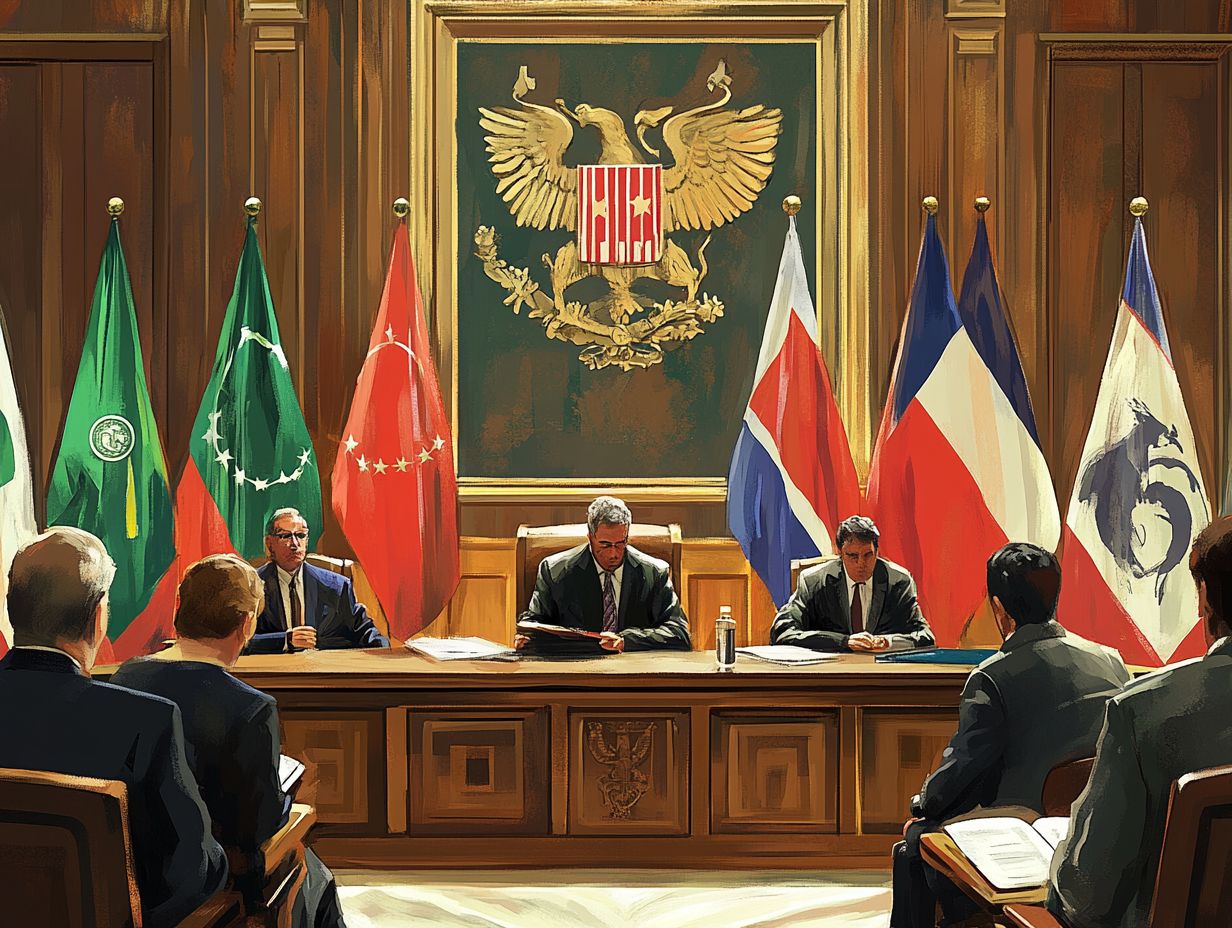
In international IP litigation, several key players significantly impact outcomes. Specialized courts, legal professionals, and organizations like WIPO all play crucial roles in resolving disputes, interpreting laws, and enforcing intellectual property rights across different jurisdictions.
Understanding their functions is essential for navigating this intricate landscape effectively.
Courts and Organizations Involved
Courts and organizations like WIPO are vital in international IP litigation, providing platforms for dispute resolution and enforcement of intellectual property rights.
These entities facilitate mediation and arbitration while working to harmonize different interpretations of IP laws, enhancing clarity for both rights holders and infringers.
With structured procedures in place, they enable consistent adjudication that addresses the intricacies of various legal systems.
Specialized courts dedicated solely to intellectual property cases allow judges to develop expertise, leading to informed and nuanced rulings.
The significance of judicial cooperation cannot be overstated; it creates an environment for jurisdictions to share resources and information, ultimately resulting in more effective resolutions and stronger protection of creators rights globally.
Challenges and Controversies in International IP Litigation
International IP litigation can be tricky, with many challenges to navigate. Conflicts of laws, jurisdictional assessments, and compliance challenges arise frequently.
These issues complicate the enforcement of intellectual property rights across different legal frameworks, requiring a keen understanding and strategic navigation to achieve successful outcomes.
Understanding these challenges is vital for protecting your rights effectively.
Conflicting Laws and Jurisdictions
Conflicting laws and jurisdictions present significant obstacles in international IP litigation. You need to carefully examine the applicable laws and strategically navigate the set of rules that determine which country’s laws apply in cross-border cases for effective dispute resolution.
When operating across borders, varying legal frameworks can lead to inconsistent interpretations and enforcement of intellectual property rights. This complexity often breeds uncertainty for businesses striving to safeguard their innovations and trademarks.
By exploring how jurisdictions differ in their approach to IP laws, you can gain a clearer understanding of the need for strong legal strategies. Private international law offers vital mechanisms for jurisdictional clarity, helping to pinpoint the most suitable legal framework.
This can dramatically speed up how quickly you resolve intellectual property disputes, enhance predictability for litigants, and promote a more harmonized global marketplace.
Enforcement and Compliance Issues
Enforcement and compliance issues stand as critical pillars in international IP litigation. They shape the effectiveness of judicial cooperation in safeguarding intellectual property across borders and ensuring adherence to international treaties.
Navigating these intricate legal landscapes can be quite the challenge, especially when jurisdictions present varying interpretations of intellectual property laws and employ different enforcement mechanisms.
This divergence complicates compliance efforts for corporations like yours. You may encounter obstacles such as limited resources, inconsistent application of legal standards, and a lack of awareness of rights among stakeholders, all of which can impede the enforcement process.
Fostering strong judicial cooperation is essential. This collaboration enables countries to work together effectively in resolving disputes and ensures that intellectual property rights are upheld in a coherent and internationally recognized manner.
Strategies for Success in International IP Litigation
Navigating international IP litigation demands not just effective legal representation but also a strategic approach to dispute resolution. This includes harnessing investment arbitration to ensure that your intellectual property rights are adequately protected and enforced across diverse jurisdictions.
Effective Legal Representation
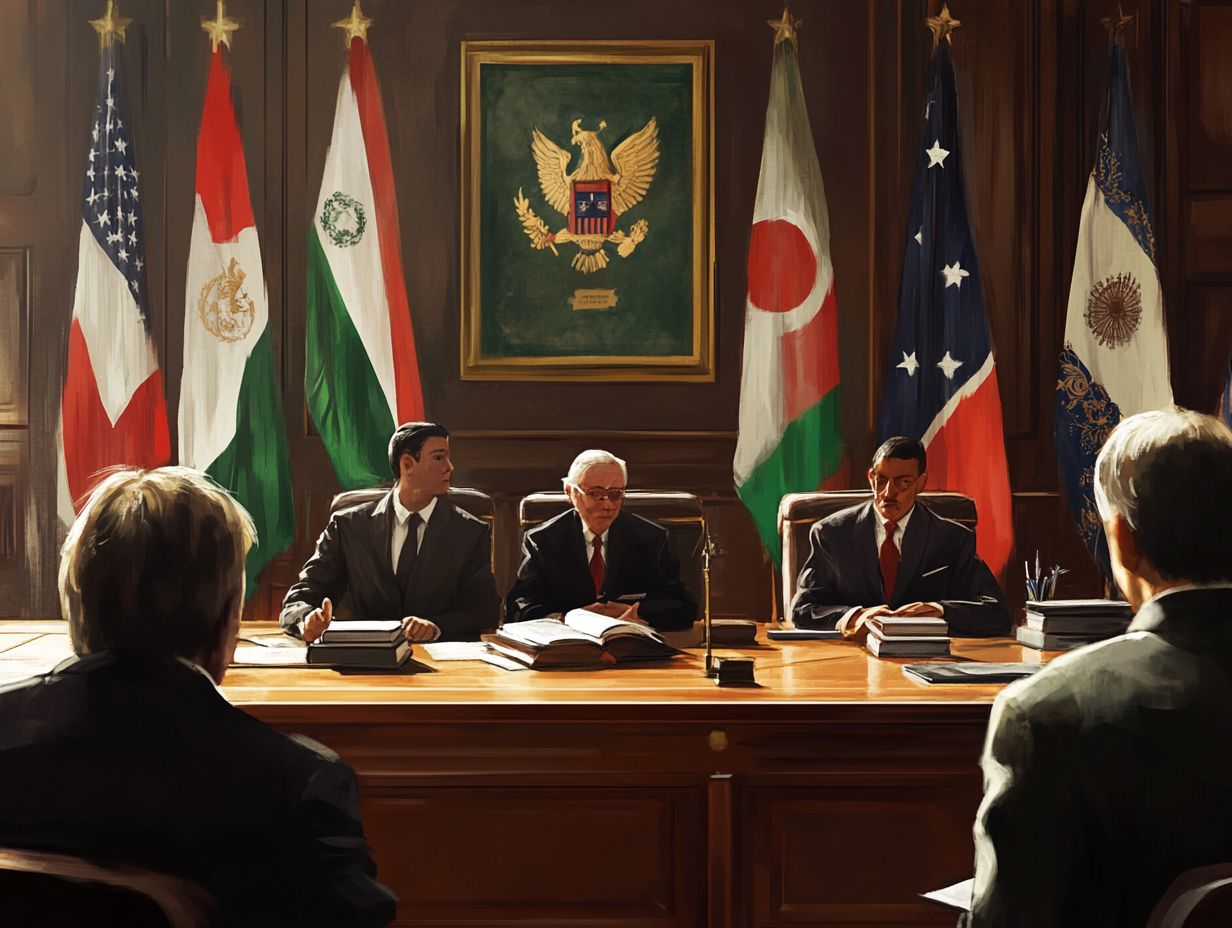
Effective legal representation is crucial in IP litigation. It ensures that your rights and interests are protected amid the intricate web of national laws and international treaties governing intellectual property.
Lawyers who specialize in this area possess a deep understanding of various legal frameworks and are skilled at identifying the nuances that can determine the success or failure of your case. They employ strategic methods, including thorough case research, meticulous documentation, and clear communication, to expertly navigate compliance challenges that often arise.
Effective representation means crafting compelling arguments that capture the court’s attention, highlighting the uniqueness and value of your intellectual property.
By leveraging their extensive knowledge and experience, these legal professionals can weave a persuasive narrative that resonates with the court, significantly enhancing your chances of achieving favorable outcomes.
Alternative Dispute Resolution Methods
Alternative dispute resolution methods, like investment arbitration, provide flexible and efficient avenues for resolving international intellectual property disputes outside traditional court systems. These approaches effectively tackle compliance issues and the legal frameworks that govern IP rights.
Not only do these methods streamline the dispute resolution process, but they also offer a tailored approach to the complexities of intellectual property cases. By prioritizing mutual agreement over lengthy litigation, you can save both time and resources while safeguarding your valuable assets.
Investment arbitration has particularly gained traction, thanks to its specialized focus on the nuances of cross-border IP rights. This adaptive framework gives you the power to navigate diverse legal landscapes, ultimately fostering a more collaborative atmosphere in international commerce.
Frequently Asked Questions
What is the role of international law in IP litigation?
International law plays a vital role in shaping the landscape of intellectual property litigation. Understanding its implications can help you navigate the complexities of global IP rights.
The Role of International Law in IP Litigation
The role of international law in IP litigation is to provide a framework for resolving disputes related to intellectual property (IP) across different countries and legal systems. It sets out rules and procedures for protecting and enforcing IP rights, ensuring fair competition, and encouraging innovation.
How Does International Law Protect IP Rights?
International law protects IP rights through various treaties, agreements, and conventions, such as the World Intellectual Property Organization (WIPO) and the Agreement on Trade-Related Aspects of Intellectual Property Rights (TRIPS). These agreements establish standards for the protection and enforcement of IP rights, including patents, trademarks, and copyrights, among participating countries.
What Is the Role of International Courts in IP Litigation?
International courts, such as the International Court of Justice and the International Criminal Court, play a crucial role in resolving IP disputes between countries. They provide a neutral forum for parties to seek redress and enforce their IP rights based on the principles of international law.
How Does International Law Impact IP Litigation in Domestic Courts?
International law significantly impacts IP litigation in domestic courts by providing guidelines for interpreting and enforcing IP laws. It serves as a source of legal authority and precedent for resolving disputes involving international parties or cross-border IP issues.
What Are Some Challenges of Applying International Law in IP Litigation?
One of the main challenges of applying international law in IP litigation is the complexity of navigating different legal systems and cultural norms. Differences in laws and enforcement mechanisms between countries can lead to conflicting decisions, making it challenging to enforce IP rights internationally.
Parties involved in IP litigation should seek the assistance of legal experts with experience in international IP law. It’s crucial to research thoroughly and understand the relevant international agreements while consulting with experts from different jurisdictions to develop a comprehensive legal strategy.
